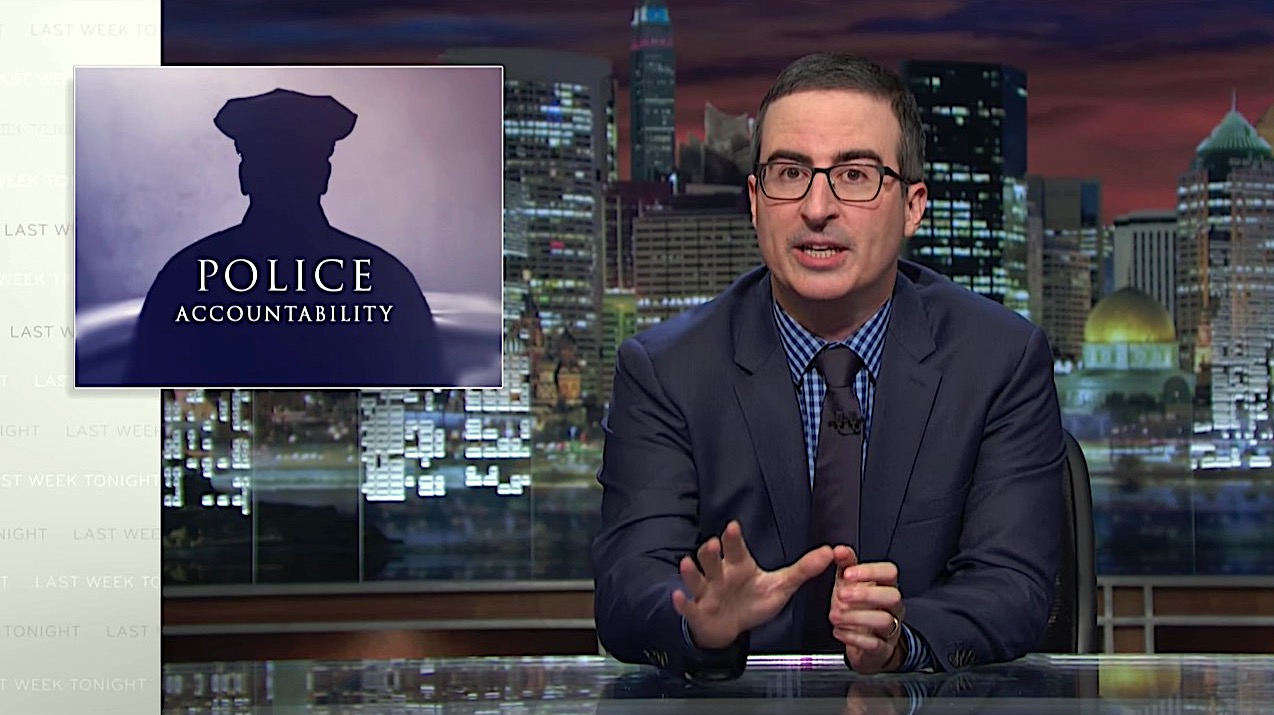John Oliver cuts into police accountability by dicing up the 'few bad apples' metaphor


"As you know, the police have been at the center of a great deal of controversy lately," John Oliver said on Sunday's Last Week Tonight. "It's been impossible to escape, from the Black Lives Matter to Colin Kaepernick's protest, to Mary J. Blige awkwardly singing a Springsteen song at Hillary Clinton." That was the setup for a discussion on police accountability, and why police and the rest of us sorely need more of it.
"The trust between police and the communities they serve is clearly a cornerstone of civilized society," Oliver said. That has been eroded by "a series of controversial police shootings," and while police "have a difficult, dangerous, challenging job," that's "all the more reason to ensure that it's done to the highest standard." Police and their unions blame most of the problems on a few "bad apples" — not institutional bias, or bad laws, or strong disincentives for prosecuting cops — and Oliver had some problems with that analogy, starting with a silly one: "Snow White wasn't afraid of apples before she took a bite out of that really bad one, but I'm telling you, the next time an old lady comes at her with a piece of fruit, Snow's going to get the f--k out of there."
Nobody really knows how many "bad apples" there are on U.S. police forces, but the most comprehensive tally of fatal police shootings shows that of the thousands since 2005, 77 police were charged with murder or manslaughter, and only 26 have been convicted. Oliver walked through why that number is so low and offered some ideas on how to fix the system. "A lack of trust in police accountability leads to a lack of trust in police," he said.
The Week
Escape your echo chamber. Get the facts behind the news, plus analysis from multiple perspectives.

Sign up for The Week's Free Newsletters
From our morning news briefing to a weekly Good News Newsletter, get the best of The Week delivered directly to your inbox.
From our morning news briefing to a weekly Good News Newsletter, get the best of The Week delivered directly to your inbox.
After showing a class where black kids are taught how to safely interact with police, and a white cop blaming a few bad apples, Oliver wrapped up: "Here's the thing about that. The phrase isn't 'It's just a few bad apples, don't worry about it,' the phrase is, 'A few bad apples spoil the barrel.' And we currently have a system set up to ignore bad apples, destroy bad apples' records, persecute good apples for speaking up, and shuffle dangerous, emotionally unstable apples around to the point that children have to attend f---ing apple classes! You cannot look at our current situation and claim that anybody likes them apples." Watch below. Peter Weber

A free daily email with the biggest news stories of the day – and the best features from TheWeek.com
Peter has worked as a news and culture writer and editor at The Week since the site's launch in 2008. He covers politics, world affairs, religion and cultural currents. His journalism career began as a copy editor at a financial newswire and has included editorial positions at The New York Times Magazine, Facts on File, and Oregon State University.
-
 World’s oldest rock art discovered in Indonesia
World’s oldest rock art discovered in IndonesiaUnder the Radar Ancient handprint on Sulawesi cave wall suggests complexity of thought, challenging long-held belief that human intelligence erupted in Europe
-
 Claude Code: the viral AI coding app making a splash in tech
Claude Code: the viral AI coding app making a splash in techThe Explainer Engineers and noncoders alike are helping the app go viral
-
 ‘Human trafficking isn’t something that happens “somewhere else”’
‘Human trafficking isn’t something that happens “somewhere else”’Instant Opinion Opinion, comment and editorials of the day
-
 ‘One Battle After Another’ wins Critics Choice honors
‘One Battle After Another’ wins Critics Choice honorsSpeed Read Paul Thomas Anderson’s latest film, which stars Leonardo DiCaprio, won best picture at the 31st Critics Choice Awards
-
 A peek inside Europe’s luxury new sleeper bus
A peek inside Europe’s luxury new sleeper busThe Week Recommends Overnight service with stops across Switzerland and the Netherlands promises a comfortable no-fly adventure
-
 Son arrested over killing of Rob and Michele Reiner
Son arrested over killing of Rob and Michele ReinerSpeed Read Nick, the 32-year-old son of Hollywood director Rob Reiner, has been booked for the murder of his parents
-
 Rob Reiner, wife dead in ‘apparent homicide’
Rob Reiner, wife dead in ‘apparent homicide’speed read The Reiners, found in their Los Angeles home, ‘had injuries consistent with being stabbed’
-
 Hungary’s Krasznahorkai wins Nobel for literature
Hungary’s Krasznahorkai wins Nobel for literatureSpeed Read László Krasznahorkai is the author of acclaimed novels like ‘The Melancholy of Resistance’ and ‘Satantango’
-
 Primatologist Jane Goodall dies at 91
Primatologist Jane Goodall dies at 91Speed Read She rose to fame following her groundbreaking field research with chimpanzees
-
 Florida erases rainbow crosswalk at Pulse nightclub
Florida erases rainbow crosswalk at Pulse nightclubSpeed Read The colorful crosswalk was outside the former LGBTQ nightclub where 49 people were killed in a 2016 shooting
-
 Trump says Smithsonian too focused on slavery's ills
Trump says Smithsonian too focused on slavery's illsSpeed Read The president would prefer the museum to highlight 'success,' 'brightness' and 'the future'
